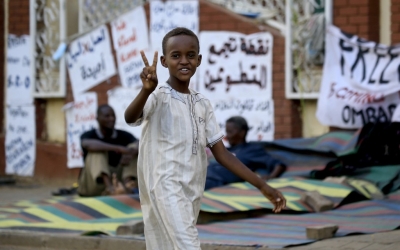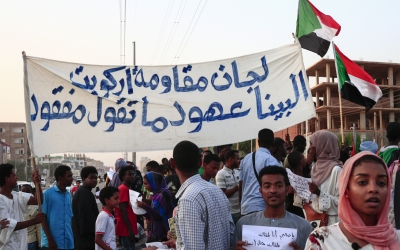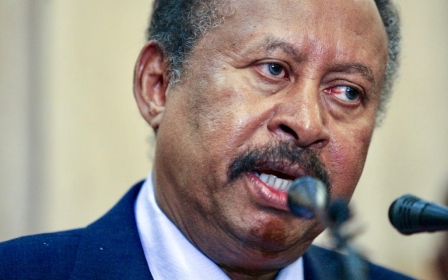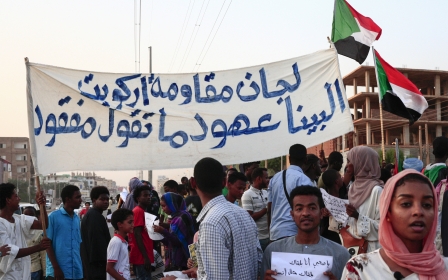Sudan's PM officially unveils country's new cabinet
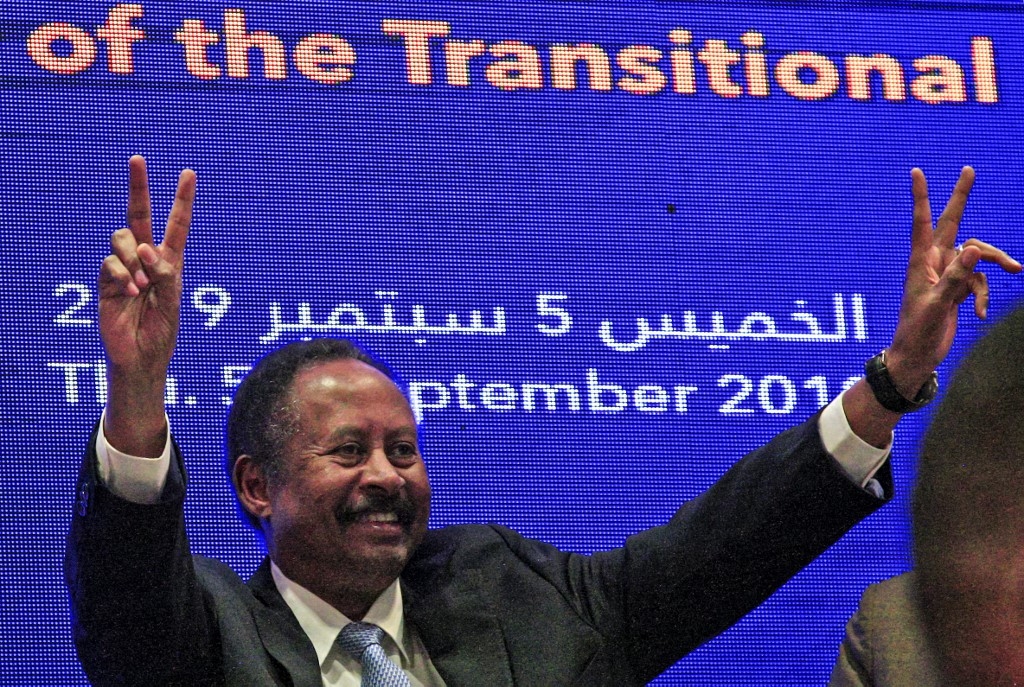
Sudan's new prime minister formally unveiled his cabinet, the first government since the overthrow of the country's longtime leader Omar al-Bashir earlier this year.
Abdalla Hamdok said on Thursday that his cabinet marks "a new era" in Sudan, which has seen months of protests and widespread calls for the creation of a civilian-led government.
His 18-member cabinet includes four women, including Sudan's first female foreign minister, Asmaa Abdallah, Hamdok said, as reported by AFP news agency.
The prime minister said two ministers would be added to the government at a later date, Reuters said.
"Today we begin a new era," said Hamdok, Sudan's first civilian prime minister in 30 years.
New MEE newsletter: Jerusalem Dispatch
Sign up to get the latest insights and analysis on Israel-Palestine, alongside Turkey Unpacked and other MEE newsletters
"The top priority of the transition government is to end the war and build sustainable peace."
'The top priority of the transition government is to end the war and build sustainable peace'
- Sudanese Prime Minister Abdalla Hamdok
The cabinet's unveiling comes as part of a three-year agreement signed last month between the military, civilian parties and protest groups in Sudan.
It also follows months of widespread popular protests across Sudan that started last December in anger over a decision to raise the price of bread.
The protesters continued to take to the streets across the country to call for the resignation of Bashir, who led Sudan for three decades, and for the formation of a civilian-led government.
Hamdok, speaking at a news conference in Khartoum on Tuesday, said his decision to include women in his cabinet was "logical", since "the women of [the] country were on the frontline of this revolution".
The cabinet will operate alongside a separate Sovereign Council, a body established last month to share power between Sudan's military and civilian opposition.
Sudanese protesters had called for a civilian-led body to lead the country's political transition after Bashir's overthrow in April, and the council was created after months of negotiations between civilian and military leaders.
Sudan's protests: A brief timeline
+ Show - HideSudanese protests have evolved in the space of less than six months from complaints about bread prices to calls for long-term leader Omar al-Bashir to go and demands for a civilian-led transition to democracy.
Here's a summary of the key moments so far since the protests began.
19 December 2018: People take to the streets in the city of Atbara to protest against a government decision to triple the price of bread, torching a local ruling party office. By the next day protesters on the streets of Khartoum and other cities calling for "freedom, peace, justice". Police try to disperse the crowds, resulting in at least eight deaths. Dozens more will be killed in the weeks of protest that follow
22 February 2019: Sudanese President Omar al-Bashir declares a nationwide state of emergency. He swears in a new prime minister two days later, as riot police confront hundreds of protesters calling for him to resign
6 April: Thousands gather outside the army's headquarters in Khartoum, chanting "one army, one people" in a plea for the military's support. They defy attempts by state security forces to dislodge them and troops intervene to protect them
11 April: Military authorities announce they have removed Bashir and that a transitional military council will govern for two years. Despite celebrations at Bashir's demise, protest leaders denounce the move as a "coup" and the protesters remain camped outside army headquarters.
14 April: Protest leaders call on the military council to transfer power to a civilian government
20 April: Sudan's military rulers hold a first round of talks with protest leaders
27 April: The two sides agree to establish a joint civilian-military ruling council, but talks stall over differences in the composition of the council, with both sides demanding a a majority
15 May: With negotiators reported to be close to agreeing a three-year transition to civilian rule, military leaders suspend talks and insist protesters remove barricades outside the army's headquarters. Talks resume on 19 May but break down again on 20 May, with the opposition insistent that a civilian must head the transitional governing body
28 May: Thousands of workers begin a two-day strike to pressure the military rulers and call for civilian government
3 June: At least 35 people killed and hundreds injured, according to opposition-aligned doctors, as security forces firing live ammunition move to disperse the protest camp outside army headquarters
4 June: General Abdel Fattah al-Burhan, the head of the military council, announces that all previous agreements with protest leaders are scrapped and says elections will be held in nine months
The Sovereign Council consists of five military leaders and six civilians.
The army will lead the newly formed body for the first 21 months under the power-sharing agreement.
The deal also stipulates that Sudan must form a legislative body within 90 days of its signing, AFP reported.
Focus on economy
Hamdok approved the first 14 ministers of his cabinet on Tuesday, but AFP said the formal announcement was delayed as the prime minister mulled over his choices.
The opposition coalition Forces of Freedom and Change (FFC), which negotiated the power-sharing deal with the military, had been talking with Hamdok since last week over his cabinet nominations.
Meanwhile, the defence and interior ministers were nominated by the military, Reuters reported.
Hamdok previously worked as an economist with the United Nations, and he has said that his priority is fixing Sudan's ravaged economy, which has led to soaring living costs in recent years.
"Sudan's economic challenge is a big challenge, but we can tackle it," Hamdok said at Tuesday's news conference, as reported by Reuters.
"In the near term, we need to address the shortage of commodity items - sugar, flour and petroleum," he said.
"On the currency front, we need to stop inflation, deal with the exchange rate of the national currency, and restore confidence to the banking system."
Middle East Eye delivers independent and unrivalled coverage and analysis of the Middle East, North Africa and beyond. To learn more about republishing this content and the associated fees, please fill out this form. More about MEE can be found here.


